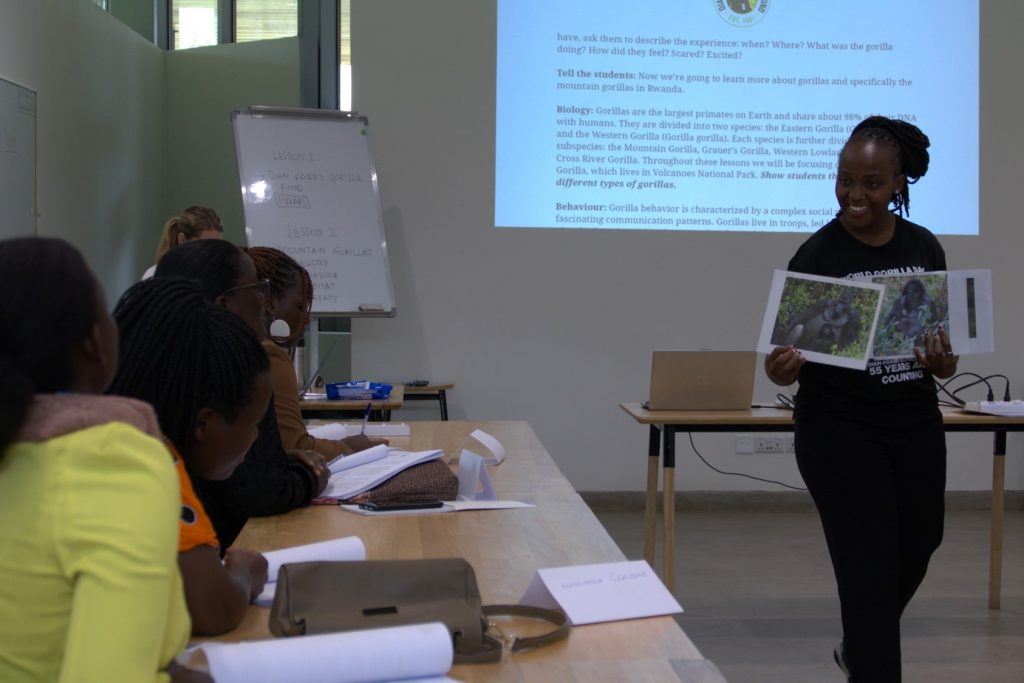
About the Together Women Rise Grants Program
Together Women Rise’s Grants Program has two key components that support our overall mission to achieve global gender equality. Featured Grants are largely focused on delivering direct services by funding grassroots organizations that empower and support women and girls in low-income and marginalized countries in the Global South. Our Transformation Partnerships are designed to invest in areas where we can make the biggest impact on achieving global gender equality by addressing the root causes of gender inequality.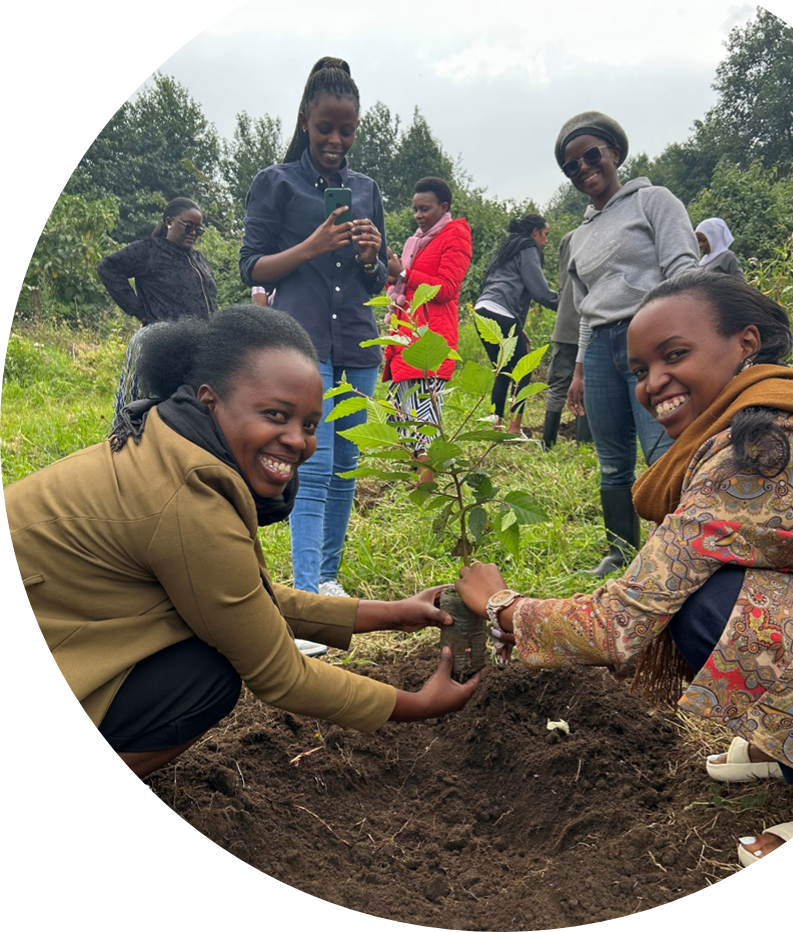
Through our Featured Grants Program, we highlight a different organization/project each month, providing a variety of learning materials on the issue and how the grant will be used.
Featured Grants may include:
- Project grants to fund a specific project or a particular deliverable for a specific timeframe; or
- General Operations grants to cover an organization’s day-to-day, ongoing expenses, such as salaries, utilities, office supplies, and more; or
- Capacity-building grants to strengthen an organization’s systems and thereby increase its effectiveness.
The Global Issue
Gender Equality and Climate Change
Women are disproportionately affected by environmental degradation and climate change in the Global South because they are often dependent on natural resources. They are the primary caretakers of water, land, and forests, engaging in activities like farming, collecting water and firewood, and managing household energy needs. They play essential roles in agricultural production, particularly in smallholder farming systems. Yet, women face barriers to accessing resources, land rights, and decision-making processes that limit their ability to be effective stewards of their environment.
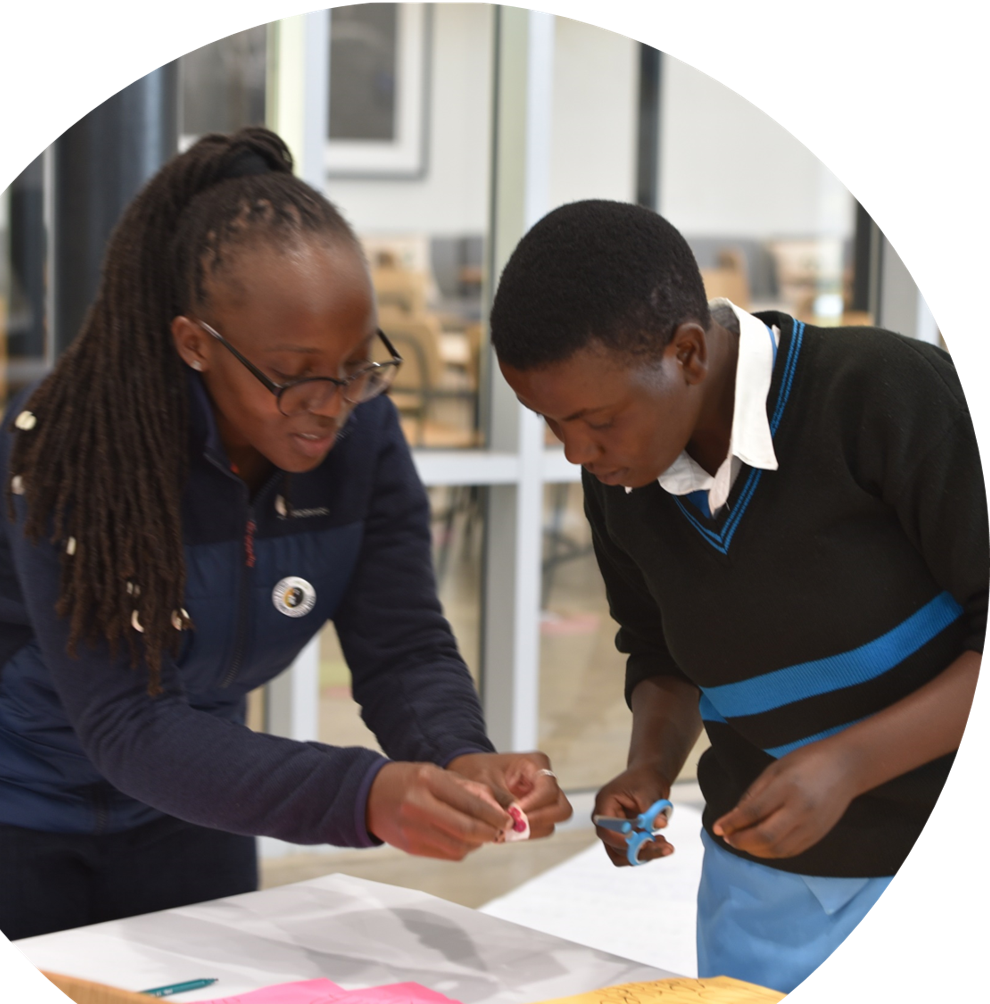 Nevertheless, those same women are at the forefront of designing and implementing community-based adaptation and resilience-building efforts, employing innovative strategies to cope with environmental challenges. They are increasingly adopting sustainable agricultural practices that promote soil health and water conservation in an effort to reverse deforestation and overgrazing which have left large swaths of land barren and depleted. And they are preserving Indigenous knowledge systems, contributing to biodiversity conservation efforts. They are taking on leadership roles within local communities, driving grassroots conservation initiatives, and advocating for environmental policies.
Nevertheless, those same women are at the forefront of designing and implementing community-based adaptation and resilience-building efforts, employing innovative strategies to cope with environmental challenges. They are increasingly adopting sustainable agricultural practices that promote soil health and water conservation in an effort to reverse deforestation and overgrazing which have left large swaths of land barren and depleted. And they are preserving Indigenous knowledge systems, contributing to biodiversity conservation efforts. They are taking on leadership roles within local communities, driving grassroots conservation initiatives, and advocating for environmental policies.
Amplifying the roles of women in environmental conservation is essential for fostering inclusive and effective approaches to sustainable development and biodiversity conservation. And it works. Educating girls can have positive conservation outcomes by reducing greenhouse gas emissions and enhancing climate resilience. According to UNESCO data, educating girls could result in a massive reduction in emissions of 51.48 gigatons by 2050. This is because educating girls has an impact beyond the individual, cascading into her family and her community. Educated girls are less likely to marry young and more likely to lead healthy, productive lives. They also have more agency and influence over decisions that affect them, such as family planning, resource management and adaptation strategies.
Life Challenges of the Women Served
Rwandan society has traditionally been patriarchal, with deep-seated cultural norms and stereotypes that shape gender roles and expectations. As a result, women face systemic discrimination and marginalization in nearly all spheres of life, including education, gender-based violence, economic empowerment, politics, and health. Around Volcanoes National Park (VNP) where the Dian Fossey Gorilla Fund works, communities are extremely poor and vulnerable to economic, social, and environmental shocks. Most are subsistence farmers growing Irish potatoes. Many have little or no formal education. The communities also include historically marginalized people who used to live in and rely on the forest and its products. The most vulnerable members of these households are women and girls.
Limited Access to Education: Rwanda has made great strides in improving access to primary and secondary education for girls. Nonetheless, disparities still exist at the primary and secondary levels, particularly in rural areas and for students from the poorest households. Educational attainment for girls in the VNP region is as low as 9 percent, as many drop out of school due to lack of financial resources. Lack of opportunities for these girls further limits their ability to break out of the poverty cycle. In Rwanda, secondary education is divided into lower and upper levels. At the upper level, there are two tracks: general and technical. Girls are much more likely to enroll in the general track and less likely to enroll in the technical track than boys. Girls are also less likely to attend tertiary education than boys.
Gender-Based Violence: Gender-based violence remains a significant issue in Rwanda, including domestic violence, sexual assault, and rape. While there have been efforts to combat this through legislation and support services, many women still face challenges in reporting abuse and accessing justice.
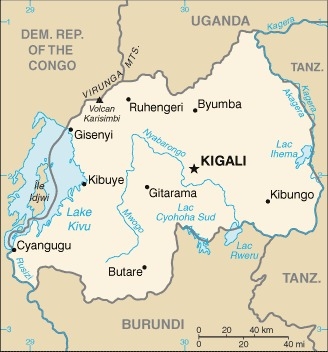 Economic Empowerment: Despite efforts to promote women’s economic empowerment, women in Rwanda often have limited access to resources and credit.
Economic Empowerment: Despite efforts to promote women’s economic empowerment, women in Rwanda often have limited access to resources and credit.
Political Underrepresentation: Rwanda has made remarkable progress in women’s political representation, with women holding over 60 percent of seats in the parliament. However, women still face challenges in attaining leadership positions.
Limited Access to Healthcare: Women in Rwanda face challenges in accessing quality healthcare services, particularly in rural areas. Maternal mortality rates remain high, and there are still gaps in reproductive health services, including access to family planning and maternal healthcare.
About Our Grantee
The Dian Fossey Gorilla Fund is dedicated to the conservation, protection, and study of endangered mountain gorillas and critically endangered Grauer’s gorillas and their habitats in Africa. Founded by legendary conservation scientist Dian Fossey, it is the longest-running and largest organization dedicated to safeguarding the region’s biodiversity, with gorillas serving as an iconic flagship species because of where and how they live. Gorillas live in the second largest tropical rainforest left on earth, an area that serves as he “lungs of the planet,” cleaning the air of the carbon dioxide that leads to climate change In addition, gorillas act as an “umbrella species” for their habitat. When they are protected, other species – many of which are endangered – are protected as well.
More than 55 years of successful conservation work in saving gorillas is based on a holistic model with four key pillars:
- Gorilla Protection
- Scientific Research
- Training Conservationists
- Helping Communities
Learn more about the Dian Fossey Gorilla Fund.
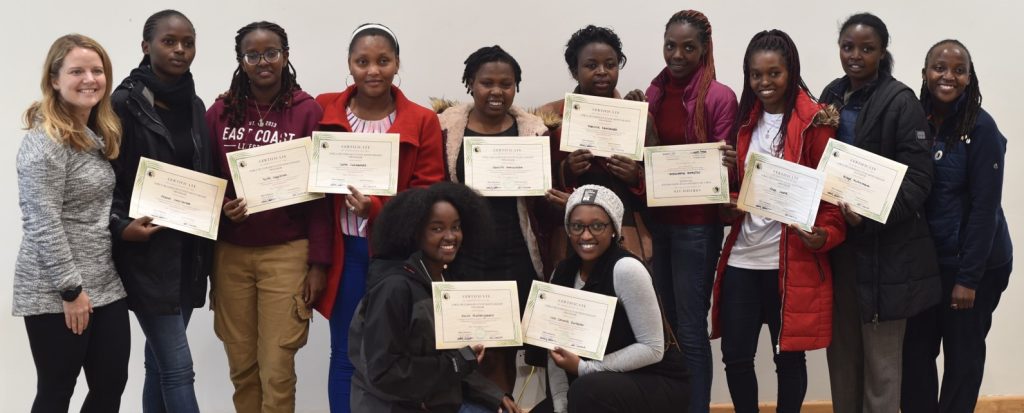
How the Grant Will be Used
Together Women Rise is providing a $50,000 Featured Grant to the Dian Fossey Gorilla Fund. With this grant, we will fund a new Girls in Conservation project that tackles education inequalities in Rwanda, gives girls opportunities outside the classroom, and promotes careers in conservation.
As part of the new Girls in Conservation project, the Fossey Fund partners with local secondary schools to provide female students with life skills and practical conservation lessons, a female mentor, and a scholarship to continue their advanced level education in government funded boarding schools. The goal of this program is to increase school attendance, education attainment, and paid opportunities after secondary school.
The program also benefits the female mentors by providing them with leadership and improved communications skills and helping to build their confidence and stature in the community. It will also build capacity of local teachers and invest in their passion to build gender equity in their classrooms.
The program has five phases:
- Training of Trainers: teachers from five schools adjacent to VNP and professional educators are trained on the Girls in Conservation curriculum covering life skills, the importance of conservation, and careers in conservation.
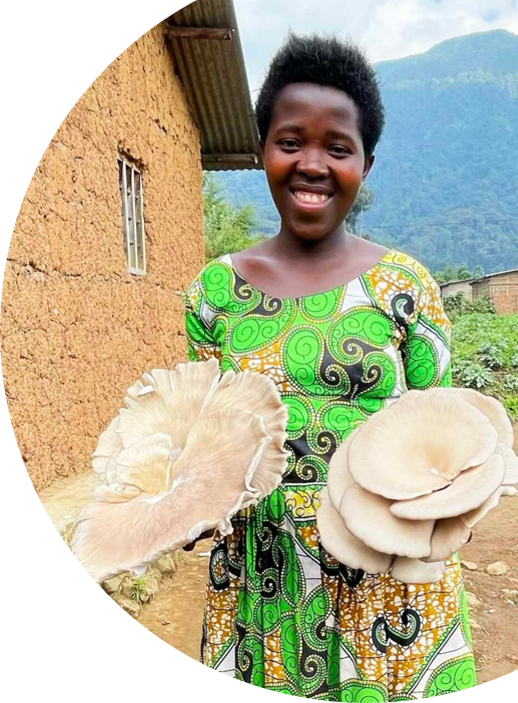
- Lesson Delivery: teachers and professional educators deliver lessons to 250 students over 3 months during the allotted club time at the schools. Students learn about local biodiversity and have experiences in nature. Students will apply for the third phase and 10 students or more from each school will be selected to participate.
- Mentorship Training and Shadow Day: mentors are selected from Fossey Fund staff and others working in conservation in the region who are actively involved in conservation careers. They are trained on how to be effective mentors to secondary students. Mentors and mentees are matched based on mutual interests and the career goals of the mentees, and they participate in a “Shadow Day” where mentees visit the mentor at their work and shadow their workday to glean insight into their job duties and responsibilities.
- Poster Presentation Workshop: Following the mentorship, students will design and give a poster presentation to their peers, mentors, parents, Fossey Fund staff, and local government officials at the Ellen DeGeneres Campus which is a hub for scientific research and discovery in the region.
- Scholarship Awards: Each year, 15 – 25 students will be selected (based on a number of criteria) for a scholarship to finish their advanced level education at a government-aided boarding school. The government places students at boarding schools around Rwanda based on their Ordinary Level (O-level) national exam results. The Fossey Fund will sponsor the remaining three years of advanced level education.
Budget
Together Women Rise is funding $50,000 of the $154,937 total cost of this two-year project, with the remaining $104,937 funded through donations and additional grants secured by the Fossey Fund.
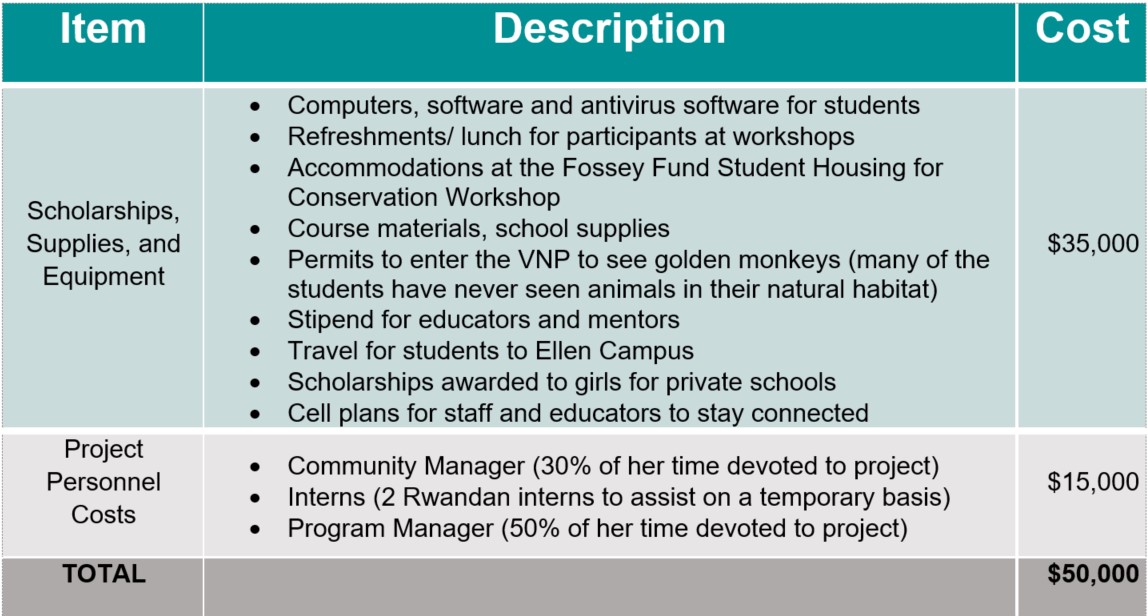
Why We Love This Project/Organization
We love this direct approach to combating girls’ lack of access to education with a sustainable approach that creates a perpetual group of women who, after attaining their educational goals, can then mentor others.
Anticipated Impact & Outcomes
Together Women Rise’s grant will directly impact 290+ people, which includes:
- 20 teachers, principals and professional educators
- 20 female mentors
- 250 students – including 50 girls in the mentorship program and 15 to 20 scholarship recipients.
The resulting conservation and economic impact can reverberate for generations
Impact Story
The Girls in Conversation program that Together Women Rise is funding is a new program for the Dian Fossey Gorilla Fund. However, the Fossey Fund has been working to advance gender equality in the region in other ways. Among those are agriculture cooperatives that promote women in leadership roles and strengthen financial independence. Here is the story of one woman impacted by that work.
Meet Xaverine –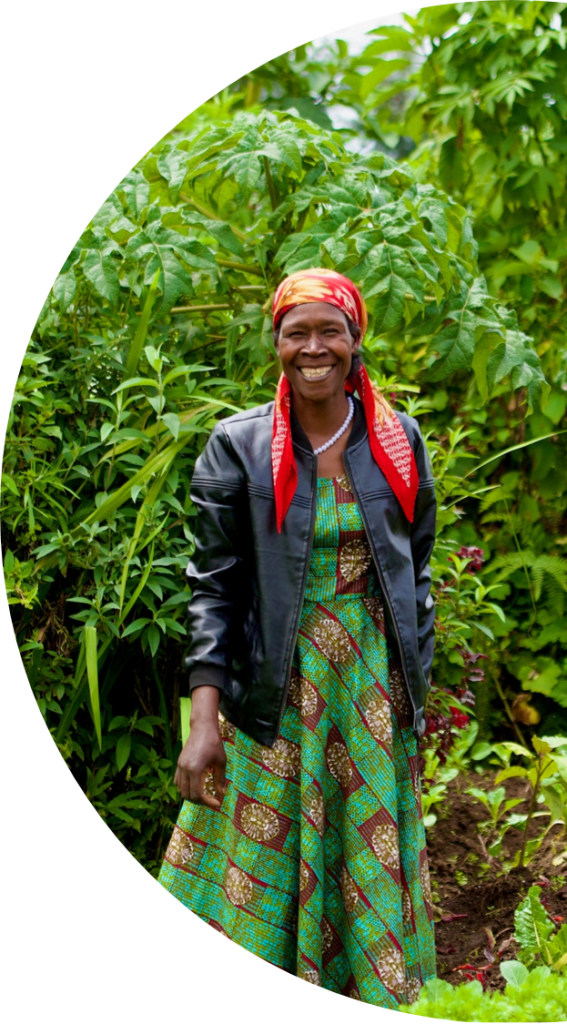
Xaverine and her family reside on the outskirts of Volcanoes National Park in Rwanda, which is home to the just over 1,000 remaining endangered mountain gorillas. Mountain gorillas face persistent threats from humans and climate change, including poaching, disease transmission and habitat destruction. The communities living near the park depend on agriculture for their livelihoods, but the dense population combined with the national park boundaries leaves limited arable land. In order to survive, families like Xaverine’s are driven to unsustainable practices that threaten the mountain gorilla population.
Xaverine is now actively involved with Abakunda Umurinmo and Intagaburuzwa cabbage and mushroom cooperatives, supported by the Dian Fossey Gorilla Fund. These cooperatives are dedicated to combating food insecurity and malnutrition within their community. Before partnering with the Fossey Fund, Xaverine and her neighbors relied heavily on the park for essential resources such as food and water to sustain their families. But since she joined the cooperatives, life for Xaverine and her family has been transformed. Xaverine now sells her cabbages to neighboring communities and businesses, generating a stable income. As a result, she can afford her children’s school fees. And through the mushroom collective, Xaverine has a sustainable source of protein and nutrition for her family and she earns additional income through the sale of mushrooms.
“Whenever we harvest mushrooms, my family has to eat and taste them, and as a result, my kids are healthier because of the Fossey Fund program that our family belongs to,” Xaverine said.
Moreover, Xaverine has a newfound sense of confidence because of her involvement in the program. Similar to the new Girls in Conservation program funded by Together Women Rise, the agriculture collectives are vital to advancing gender equity in the region where the Fossey Fund works by promoting women in leadership roles and strengthening financial independence.
Beyond the economic and nutritional benefits, Xaverine has become an outspoken advocate for gorilla conservation. Understanding that the well-being of both the local community and the gorillas are intertwined, Xaverine actively promotes the coexistence of thriving human communities and protected wildlife habitats.
Learn More
Rwanda staff member Nadia Niyonizeye will manage this project. Hear her story in her own words.
Explore the video vault of the Dian Fossey Fund.
Source Materials
- UN Women – Gender Inequality and Climate Change
- UN – Women and Climate Change
- Girls’ Education in Rwanda
- Gender Gap in Secondary Education in Rwanda
- Gender Parity in Education in Rwanda
- Education System in Rwanda
- Women in Parliament
- Rwanda Demographic and Health Survey
